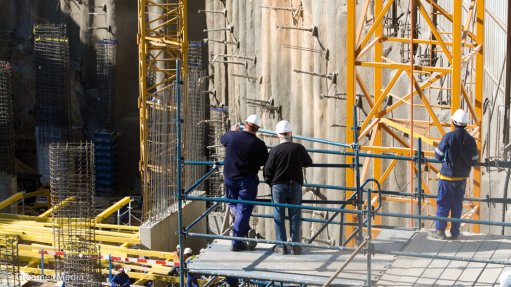
Photo by: Duane Daws
South Africa’s Construction Industry Development Board (CIDB) has summoned 15 construction companies to appear before an independent investigating committee for a formal inquiry in April.
Following its own investigation into collusive practices in the construction industry, the industry body this week served charges on 15 contractors listed on its register of contractors, for contravention of its code of conduct for parties engaged in construction procurement.
As part of its Construction Fast-Track Settlement Process, the Competition Commission, in June 2013, fined 15 major construction firms a collective R1.46-billion for their participation in collusive tendering between 2006 and 2011.
These 15 companies had been called to appear before the CIDB’s investigating committee.
The firms included Murray & Roberts; Basil Read; Aveng; Esorfranki; G Liviero Building; Wilson Bayly Holmes-Ovcon Construction; Giuricich, Haw & Inglis Civil Engineering; Hochtief Solutions; Norvo Construction; Raubex; Rumdel; Stefanutti Stocks Holdings; Tubular Technical Construction and Vlaming.
“It has been a protracted process since allegations of collusion in the construction industry first surfaced in 2011, to this point, where we are finally able to bring charges against these construction companies, in terms of our specific legislative and regulatory mandate,” the industry body said on Wednesday.
Further, the CIDB noted that this was a significant step in intensifying the effort to address fraudulent and corrupt behaviour in public sector projects, in the interest of transparency, fairness and economic transformation in the construction industry.
“As the public is aware, there are other companies that have been implicated in the construction collusion scandal. Not all of these construction companies are included in this first phase of the CIDB investigation process,” it pointed out.
The CIDB’s action would, for now, only be limited to the 15 companies that had made disclosure of their participation in collusive conduct to the commission.
“More work is under way to bring all construction companies involved to book, including investigating those companies that have declined to cooperate with the commission,” it added.
SANCTION PROCESS
After the conclusion of the formal inquiry, the investigating committee would have to, within 30 days, make a finding as to whether the respondents were guilty of the charges.
If the parties were found guilty, the CIDB could impose a number of sanctions against those companies, including the removal of the name of a contractor from its register; issuing a warning to the respondent, which remained valid for a period not exceeding one year; or downgrading the respondent’s current contractor grading designation in the register by a maximum of two grades, for a period determined by the investigating committee.
Further, the CIDB could also impose a fine not exceeding R100 000; and restrict or prohibit the respondent from participating in public sector construction work procurement for up to ten years.
It could also order the cancellation of the registration of the respondent and place a prohibition on the re-application for registration by the respondent on the register; and make a cost determination that the accused, the CIDB or the party who initiated the investigation, must defray all or part of the costs incurred to conduct the formal inquiry.
It could also implement a combination of these sanctions.